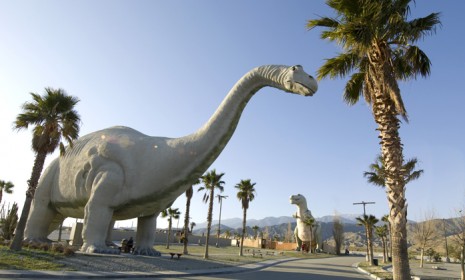Did farting kill the dinosaurs?
Gassy vegetarians like the Brontosaurus may have produced so much methane that they triggered global warming, possibly hastening their extinction

A free daily email with the biggest news stories of the day – and the best features from TheWeek.com
You are now subscribed
Your newsletter sign-up was successful
While scientists are touting a new study of dinosaur flatulence as a "major new climate finding," the media is greeting it with undisguised mirth. According to this research, the prehistoric beasts may have tooted so much methane into the air that they triggered a catastrophic climate change and, consequently, their own extinction. Here's a guide to the revolutionary — and, for some, giggle-worthy — findings:
What's this new research?
A study by a team of British scientists published in Current Biology argues that dinosaur flatulence "turned the Earth into one giant Dutch oven, contributing significantly to a warmer climate 150 million years ago," says Slate. When long-necked sauropod dinosaurs like the Brontosaurus digested vast amounts of plants and vegetation, they produced methane, says Reuters, a potent greenhouse gas that has "as much as 25 times the climate-warming potential as carbon dioxide," and ultimately warmed the planet during the "hot, wet Mesozoic era."
The Week
Escape your echo chamber. Get the facts behind the news, plus analysis from multiple perspectives.

Sign up for The Week's Free Newsletters
From our morning news briefing to a weekly Good News Newsletter, get the best of The Week delivered directly to your inbox.
From our morning news briefing to a weekly Good News Newsletter, get the best of The Week delivered directly to your inbox.
How did researchers discover this?
Using a mathematic model, the scientists compared the sauropod dinosaurs' digestive systems to those of modern-day cows, who also require methane-producing microbes to metabolize plants. According to their calculations, a 140-foot, 90-ton Argentinosaurus, for example, would have consumed at least half a ton of food each day, yielding thousands of pounds of methane discharges. Over time, the build-up of methane trapped heat in the Earth's atmosphere. Previous studies have found that temperatures were 10 degrees Celsius warmer in the Mesozoic era than they are now.
And this is being linked to dinosaur extinction?
Until now, dinosaur extinction has most often been attributed to an asteroid strike combined with volcanic activity, says Fox News, but this new evidence suggests that the creatures hastened their demise by exacerbating global warming. While the study may not be "definitive proof that dinosaurs basically farted themselves to death," says The Mark, it does make the case that warmer temperatures were, at least, a threat to their existence.
A free daily email with the biggest news stories of the day – and the best features from TheWeek.com
Could this happen again?
The study certainly raises important questions about the role animals play in climate change, says The Mark. But rest assured that today's cows and other livestock produce methane at far more moderate levels. "Cows today produce something like 50-100 [million tons] per year," says Dr. David Wilkinson, who conducted the study, whereas the sauropod dinosaurs were pumping roughly 520 million tons of methane into the atmosphere annually.
How is the media dealing with this news?
Somewhat childishly, admittedly. Bloggers reporting this story are positively giddy with fart humor. "Dinosaurs: Undone by their rear ends?" quips The Mark in its headline. "While this new research may not shed light on the 'denied, supplied it' or 'smelt it, dealt it' theories," says Slate, "it does suggest that living during the time of the dinosaurs would have totally stunk."
-
 ‘The West needs people’
‘The West needs people’Instant Opinion Opinion, comment and editorials of the day
-
 Filing statuses: What they are and how to choose one for your taxes
Filing statuses: What they are and how to choose one for your taxesThe Explainer Your status will determine how much you pay, plus the tax credits and deductions you can claim
-
 Nan Goldin: The Ballad of Sexual Dependency – an ‘engrossing’ exhibition
Nan Goldin: The Ballad of Sexual Dependency – an ‘engrossing’ exhibitionThe Week Recommends All 126 images from the American photographer’s ‘influential’ photobook have come to the UK for the first time